Related Research Articles

Mary Loretta Landrieu is an American politician, entrepreneur, and former U.S. Senator for the state of Louisiana. She is a member of the Democratic Party.
Stephen Wade Rathke is a community and labor activist who founded the Association of Community Organizations for Reform Now (ACORN) in 1970 and Service Employees International Union (SEIU) Local 100 in 1980. He was ACORN's chief organizer from its founding in 1970 until June 2, 2008, and continues to organize for the international arm. He is the publisher and editor-in-chief of Social Policy, a quarterly magazine for scholars and activists. The magazine's publishing arm has published four of his books. He is also a radio station manager of KABF, WAMF, and WDSV.
The Association of Community Organizations for Reform Now (ACORN) is an international collection of autonomous community-based organizations that advocated for low- and moderate-income families by working on neighborhood safety, voter registration, health care, affordable housing, and other social issues. They, along with a number of other community unions, are affiliated under ACORN International.
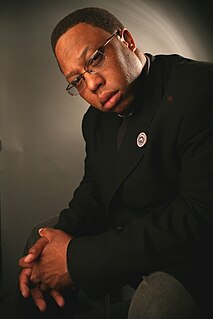
Lennox Yearwood, Jr. is a minister and community activist who is also an influential member of political hip hop. Yearwood currently serves as President of the Hip Hop Caucus, a national nonprofit, nonpartisan organization that empowers young people to participate in elections, policymaking and service projects. Yearwood has led or been involved in a number of high-profile campaigns to engage young voters, as well as working on human rights issues in the Gulf Coast region after Hurricane Katrina.
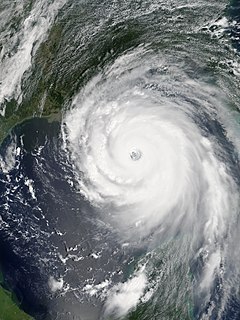
Hurricane Katrina was a large and destructive Category 5 Atlantic hurricane that caused over 1,800 fatalities and $125 billion in damage in late August 2005, especially in the city of New Orleans and the surrounding areas. It was at the time the costliest tropical cyclone on record and is now tied with 2017's Hurricane Harvey. The storm was the twelfth tropical cyclone, the fifth hurricane, and the third major hurricane of the 2005 Atlantic hurricane season, as well as the fourth-most intense Atlantic hurricane on record to make landfall in the contiguous United States.
The Hip Hop Caucus (HHC) is a national, non-profit organization in the United States, which aims to promote political activism for young U.S. voters using hip-hop music and culture.

The disaster recovery response to Hurricane Katrina included federal government agencies such as the Federal Emergency Management Agency (FEMA), the United States Coast Guard (USCG), state and local-level agencies, federal and National Guard soldiers, non-governmental organizations, charities, and private individuals. Tens of thousands of volunteers and troops responded or were deployed to the disaster; most in the affected area but also throughout the U.S. at shelters set up in at least 19 states.
Hurricane Katrina had many social effects, due the significant loss and disruption of lives it caused. The number of fatalities, direct and indirect, related to Katrina is 1,833 and over 400,000 people were left homeless. The hurricane left hundreds of thousands of people without access to their homes or jobs, it separated people from relatives, and caused both physical and mental distress on those who suffered through the storm and its aftermath, such as Post-traumatic stress disorder (PTSD).

Malik Rahim is an American housing and prison activist based since the late 1990s in the New Orleans area of Louisiana, where he grew up. In 2005 Rahim gained national publicity as a community organizer in New Orleans in 2005 to combat the widespread destruction in the aftermath of Hurricane Katrina; there he co-founded the Common Ground Collective.

The New Orleans Public Library (NOPL) is the public library service of the city of New Orleans, Louisiana, United States.

The first round of the New Orleans mayoral election of 2006 took place on April 22, 2006; a runoff between incumbent Mayor Ray Nagin and Louisiana Lieutenant Governor Mitch Landrieu took place on May 20, resulting in reelection for Mayor Nagin. The Mayor of New Orleans is the top official in New Orleans' mayor-council system of government.

Internally displaced persons in the United States are people from the Gulf States region in the southern United States, most notably New Orleans, Louisiana, who were forced to leave their homes because of the devastation brought on by Hurricane Katrina in 2005 and were unable to return because of a multitude of factors, and are collectively known as the Gulf Coast diaspora and by standard definition considered IDPs. At their peak, hurricane evacuee shelters housed 273,000 people and, later, FEMA trailers housed at least 114,000 households. Even a decade after Hurricane Katrina, many victims who were forced to relocate were still unable to return home.

The Robert F. Kennedy presidential campaign began on March 16, 1968, when Robert Francis Kennedy, a United States Senator from New York, mounted an unlikely challenge to incumbent Democratic United States President Lyndon B. Johnson. Following an upset in the New Hampshire Primary, Johnson announced on March 31 that he would not seek re-election. Kennedy still faced two rival candidates for the Democratic Party's presidential nomination: the leading challenger United States Senator Eugene McCarthy and Vice President Hubert Humphrey. Humphrey had entered the race after Johnson's withdrawal, but Kennedy and McCarthy remained the main challengers to the policies of the Johnson administration. During the spring of 1968, Kennedy campaigned in presidential primary elections throughout the United States. Kennedy's campaign was especially active in Indiana, Nebraska, Oregon, South Dakota, California, and Washington, D.C. Kennedy's campaign ended on June 6, 1968 when he was assassinated at the Ambassador Hotel in Los Angeles, California, following his victory in the California Primary. Had Kennedy been elected, he would have been the first brother of a U.S. President to win the presidency himself.
William P. Quigley is a law professor and Director of the Law Clinic and the Gillis Long Poverty Law Center at Loyola University New Orleans. He was named the Pope Paul VI National Teacher of Peace by Pax Christi USA in 2003.
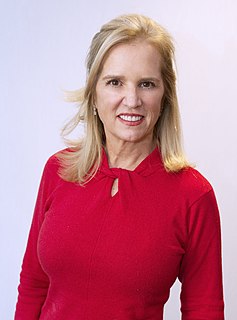
Mary Kerry Kennedy is an American lawyer, author and human rights activist. She is the seventh child and third daughter of Robert F. Kennedy and Ethel Skakel Kennedy. During her 15-year marriage to former New York Governor Andrew Cuomo, from 1990 to 2005, she was known as Kerry Kennedy-Cuomo. She is the president of Robert F. Kennedy Human Rights, a non-profit human rights advocacy organization.
Metropolitan Community Church of New Orleans is an LGBT-affirmative church in New Orleans. It is a member of the Metropolitan Community Church denomination, and has not held a dedicated edifice for the majority of its history.
Mohammed Ahmed Abdallah is a Sudanese physician and human rights activist.
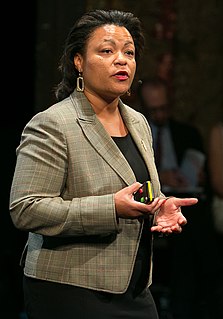
LaToya Cantrell is an American politician serving as the Mayor of New Orleans, Louisiana since May 7, 2018. A Democrat, Cantrell is the first woman to hold the office. Before becoming mayor, Cantrell represented District B on the New Orleans City Council from 2012–2018.
The Association of Community Organizations for Reform Now (ACORN) is an international collection of autonomous community-based organizations that advocated for low- and moderate-income families by working. The association was founded in 1970 by Wade Rathke and Gary Delgado, and, at its peak in the US, had over 500,000 members and more than 1,200 neighborhood chapters in over 100 cities.
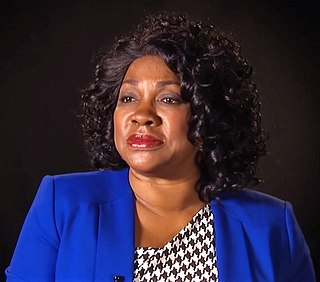
Beverly Wright is an American environmental justice scholar and the founder of the Deep South Center for Environmental Justice at Dillard University. Her research considers the environmental and health inequalities along the Mississippi River Chemical Corridor. Her awards and honours include the Environmental Protection Agency Environmental Justice Achievement Award.
References
- 1 2 3 4 Andrew Miga (November 16, 2005). "New Orleans Activist Wins RFK Award" . Retrieved July 2, 2012.
- 1 2 3 "About Us". Alliance Institute. Archived from the original on 2 June 2012. Retrieved 22 August 2012.
- 1 2 3 "2005: Stephen Bradberry, New Orleans". Robert F. Kennedy Center for Justice and Human Rights. Archived from the original on May 20, 2013. Retrieved July 2, 2012.
- ↑ Peter Whoriskey (March 7, 2006). "Voter turnout will be major effort for New Orleans". The Boston Globe. Retrieved July 2, 2012.
- ↑ Nicole Gaouette and Ann Simmons (November 30, 2006). "Judge orders FEMA to resume payments to Katrina victims". Seattle Times. Retrieved July 2, 2012.
- ↑ Danielle Wright (August 29, 2011). "Six Years After Hurricane Katrina, Most Vulnerable Populations Still Need Help". BET. Retrieved July 2, 2012.
- ↑ "On RFK'S 80th Birthday, New Orleans Organizer Presented Human Rights Award". Robert F. Kennedy Center for Justice and Human Rights. Archived from the original on April 15, 2013. Retrieved July 2, 2012.
- ↑ Farai Chideya (24 October 2008). "FBI Opens Investigation Into ACORN". NPR. Retrieved 2 July 2012.
- ↑ Dahr Jamail (January 14, 2011). "U.S.: Sick Gulf Residents Beg Officials for Help". Inter Press Service. Retrieved July 2, 2012.